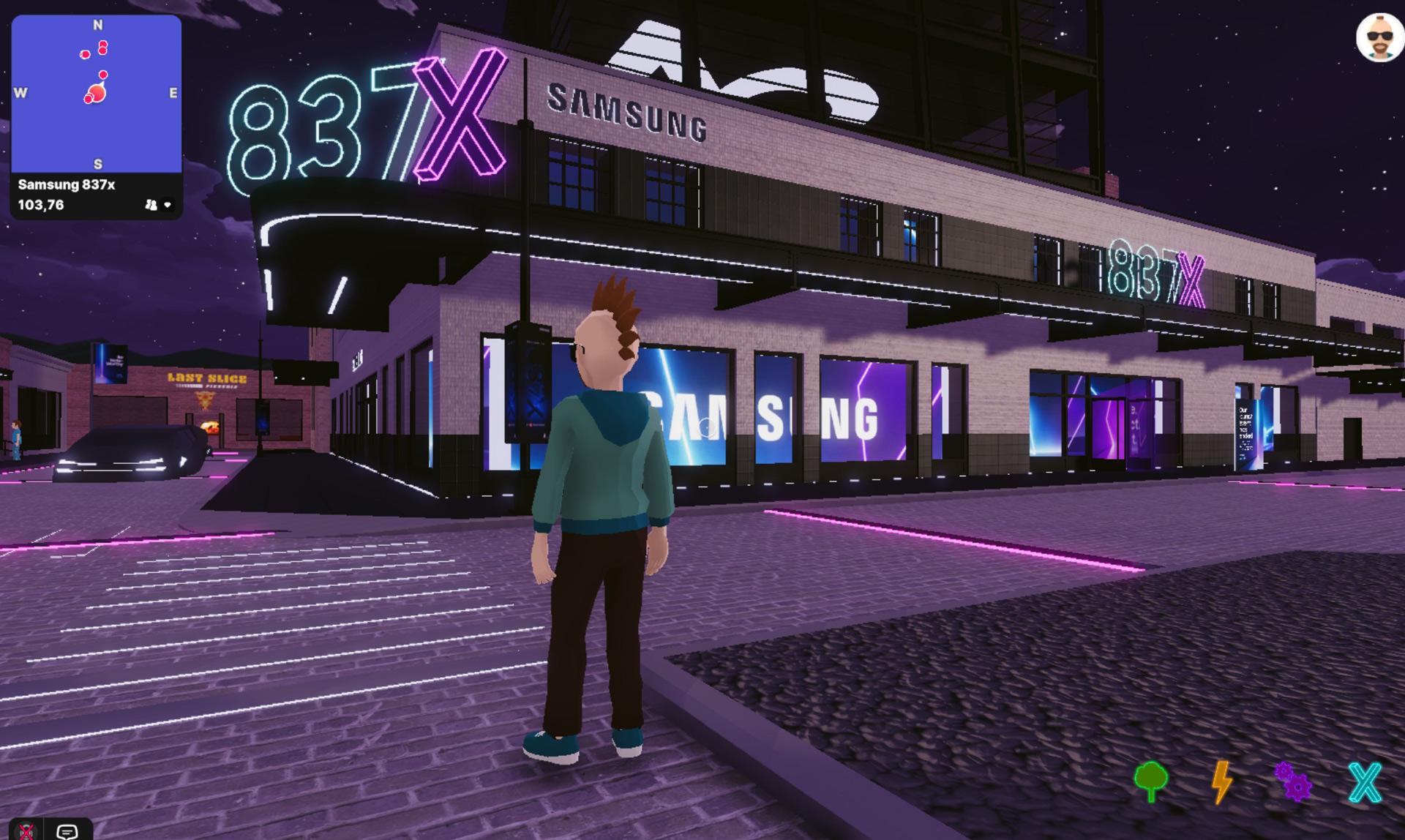The metaverse: what is it and why should you care?
One giant leap for virtual worlds

Have you ever momentarily zoned out in a meeting, only to quickly realize that you’ve missed something absolutely critical, and now the discussion is virtually incomprehensible? You could be forgiven for wondering if the entire world has done something similar when it comes to the so-called ‘metaverse.’
The term is currently Silicon Valley’s big buzzword, with a number of firms reportedly appointing a ‘Chief Metaverse Officer’ to their boards, and companies are trying to tie whatever they do to ‘the metaverse.’
You can read TechRadar’s corporate cousin PCGamer, which has documented this phenomenon for more. Pretty much anything that was even vaguely related to augmented reality or virtual reality was suddenly branded as part of the metaverse.
So the obvious question to ask is… what actually is the metaverse? It’s an important question as serious companies - not just fly by night start-ups - are taking it seriously. Since Facebook announced its parent company was rebranding as Meta, executives from a wide range of companies, including Microsoft and Disney, have all now talked publicly about how they want in on it.
Samsung has even unveiled its own metaverse product, a virtual home called ‘My House’. So let’s figure out what the metaverse actually is.
What actually is the metaverse?
In a nutshell, the metaverse doesn’t actually exist yet - but it is a much-hypothesized idea of what the future of the internet could look like. And annoyingly, there isn’t a single clear definition. The metaverse envisaged by Mark Zuckerberg is probably somewhat different to the metaverse envisaged by Microsoft CEO Satya Nadella, and so on.
But roughly speaking, the goal is something like the virtual worlds depicted in Ready Player One or The Matrix, albeit with less overtly dystopian overtones (the name was actually coined by author Neal Stephenson in his 1992 novel Snow Crash). The idea is that one day, VR and related technologies could be our primary interface to the internet, and we will, in effect, spend a lot of time living in a virtual world.
Get daily insight, inspiration and deals in your inbox
Sign up for breaking news, reviews, opinion, top tech deals, and more.
“The defining quality of the metaverse will be a feeling of presence - like you are right there with another person or in another place,” wrote Mark Zuckerberg in his ‘Founder’s Letter’, which announced his company’s name change. He envisages a future hinted at by Facebook’s Horizon Workrooms - virtual spaces in which we can interact with each other using avatars.
But, importantly, the metaverse is not just about VR. The idea and scope are much broader - and encompass a much larger bucket of concepts and technologies, which are just as important as the strapping-a-computer-to-your-face element.
The best articulation of this future perhaps comes from Matthew Ball, who is essentially the grand prophet of the metaverse. He’s a venture capitalist and investor who has written extensively on the topic, and it appears to be his ideas that have informed the thinking of Mark Zuckerberg - and the rest of Silicon Valley.
In a series of punishingly long (but incredibly interesting) essays, he describes the metaverse as follows:
“The Metaverse is a massively scaled and interoperable network of real-time rendered 3D virtual worlds which can be experienced synchronously and persistently by an effectively unlimited number of users with an individual sense of presence, and with continuity of data, such as identity, history, entitlements, objects, communications, and payments.”

In other words, his vision is a metaverse that is not a single system. It will not be owned by any individual company, or like logging into any one particular 3D world. But it will be structured like the internet is today, as a network that is not controlled by any one individual entity. Instead, a common set of standards and connections enable different companies to build their own virtual environments on top of it.
To make this place a reality, it will require a constellation of other technological building blocks to all fall into place.
The most obvious requirement is better VR hardware. Existing headsets are bulky, low-resolution, and annoying to wear. But this is something we can probably expect incremental improvements to solve. Now that Facebook is Meta, we can perhaps better understand why in 2014, Zuckerberg paid $2 billion for headset-maker Oculus.
The hardware, however - and this includes the enormous computing power at the back end required to host entire virtual worlds - is just one tiny piece of the puzzle.
For example, there will also need to be a broad system of tools and standards that will enable other companies to build for the metaverse, so that everyone can exist in the same virtual space together. Think something like the metaverse-equivalent of the HTTP protocol for transferring data, and HTML code for writing web pages. We’ll need a way to make sure that virtual objects are compatible outside of any one company’s ecosystem.
And a fully functioning metaverse will need to have an economy. If we’re to ape the real world, we need to be able to buy and own virtual goods, without relying on the goodwill of any one specific provider. Believe it or not, this is one particular area where cryptocurrencies and NFTs could conceivably fill the gap, as they would enable us to have digital money and a permanent record of what we own.
It means that when you buy your avatar a new hat, you should be able to wear it across virtual experiences - whether you’re in a work meeting or playing an action game, and when you’re done with it, you should be able to sell the hat for real, meaningful cash.
Unsurprisingly then, though this is roughly the stated end goal, we’re some distance from a point when it will actually exist. But there are companies today, like Meta, that are putting the building blocks in place.

Who will build the metaverse?
Now the really interesting question: If the metaverse is the future, which companies are best placed to win the battle to build it?
Despite Mark Zuckerberg’s high-profile announcement, Matthew Ball’s prophecies are perhaps more bullish about another company: Epic Games.
Epic is the company behind Fortnite and the Unreal Engine, which is the 3D world-building software that is already used for countless games and ever more virtual experiences - such as in the production of The Mandalorian.
Tim Sweeney, Epic’s CEO, is on the record as one of the metaverse’s strongest advocates. Perhaps this is unsurprising, given that his company is in a rather unique position.
For example, if we go back to the building blocks that the metaverse will require, several of them are already provided by Epic: it has its own user account system with friends lists, and Unreal Engine is already a common 3D development platform, meaning that objects made for one experience can easily be dropped into another.
And through Fortnite, we can catch a glimpse of what the Metaverse could be like: In the game, you play as a highly customizable avatar. And the game is no longer just about shooting people - the company has broadened it out to encompass everything from 3D concert experiences to communal film viewing.
Given how we at TechRadar have used Fortnite over lockdown, as an ambient form of socializing with friends and family, where playing the game is basically secondary to the act of being in the same virtual space as distant friends, we’re almost starting to believe that Epic might be on to something, too.

The real killer app
However, there is another major candidate for the company that is best placed to win the metaverse: Microsoft. “The metaverse is here, and it’s not only transforming how we see the world but how we participate in it,” tweeted CEO Satya Nadella in 2021, having previously told investors on an earnings call that he plans to take Microsoft into the metaverse.
The metaverse is here, and it’s not only transforming how we see the world but how we participate in it – from the factory floor to the meeting room. Take a look. pic.twitter.com/h5tsdYMXRDNovember 2, 2021
And like Epic with Unreal Engine, he wants Microsoft to not outright own the metaverse, but to build the tools that everyone will use to create the metaverse. A bit like selling shovels during a gold rush.
There’s another reason to believe Microsoft might be the big winner too. It might already have the killer app for the metaverse. No, not turning the Xbox into something like Ready Player One but… Microsoft Office.
The bull case for Microsoft’s metaverse is best articulated by tech analyst Ben Thompson, who argues that it is work where the metaverse will really shine. He paints a picture of a future where joining VR meetings is just as easy as joining a Zoom call because you’re already wearing your VR headset.
He argues that a lot of work is now geography-agnostic, and in fact a lot of working from home is about finding a quiet, isolated place to work away from the distractions of the home. So it doesn’t take a massive leap to imagine how VR could bridge this gap. What if putting on a VR headset was akin to going to the office?
He points to his experience trying Facebook Horizon Workrooms, and the fact that you can bring your computer into the VR simulation - seeing your screen and even your keyboard floating in front of you in virtual space. VR means that in an instant, you’re already sitting with your colleagues, and it creates the same sort of ambient connections we once found working in the same physical rooms.
So why is Thompson betting on Microsoft and not Facebook? In Thompson’s view, despite Facebook having created a cool workroom experience, it is Microsoft that has the advantage because it already owns the rest of the connective tissue in the office: emails happen in Outlook, documents are prepared in Word, and inter-office communication and collaboration already happen through Teams. So if Microsoft can build some of the building blocks it needs (it’s already building 3D worlds for Teams), the company already has the rest of the virtual office ready to go.
So forget The Matrix, perhaps the future looks more like another 1999 film: Office Space.

Beware the nonsense
Whether or not the metaverse will ever truly emerge remains to be seen. There’s a strong chance that the Metaverse discourse will age just as badly as an episode of Reboot. But equally, it does seem right that something will emerge - though whether it will be an existing tech behemoth that cracks it remains to be seen.
There is one thing we can know for sure though: now that people are talking about the Metaverse, you’re going to continue to hear about it endlessly. Just as ‘artificial intelligence’ and ‘fake news’ lost all meaning as soon as they caught on as buzzwords, you can bet that we’re going to be hearing about anything and everything being a ‘metaverse’ investment, however tenuous.
So there’s going to be a lot of nonsense - but at least now you should have a better idea of what on earth everyone is talking about. At least, assuming the hype hasn’t moved on to Web3 instead.